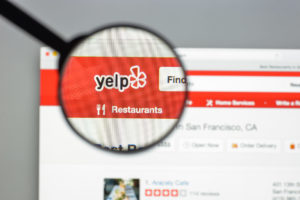Another Yelp defamation lawsuit is afoot.
Attorney Anthony Hughes is suing user “Shaan D” for defamation over a terrible review on his Yelp page. Hughes insists the online missive is an over-sized word-salad of lies.
What The Yelp!?
In addition to bashing his lawyering skills, Shaan D posted more personal accusations on Hughes’ Yelp page; she typed that he “asked her out” after a legal consultation.
Since the post hit pipelines, Hughes says his practice has suffered. The beleaguered lawyer explained:
“We did have one client’s boyfriend call up and say that he didn’t want his girlfriend to be represented by our office because of the negative review.”
Who Is This Masked Yelper? A Competitor?
“I think that this is a review writer for hire from India,” admitted Hughes when asked about the case. He continued: “The bankruptcy attorney industry is very competitive, so I haven’t ruled out the fact that it could be a competitor.” “The bankruptcy attorney industry is very competitive, so I haven’t ruled out the fact that it could be a competitor.”
And he may have a point. Far-fetched as it may seem, businesses that are desperate to gain any advantage will hire writers to trash competitors online. Incorrectly linking liability to propinquity, some folks hire overseas smear elves to do their dirty work.
But, that’s not how it works. Using foreign Web marketers to lie about competitors online doesn’t get you off the legal hook. If you hire someone to lie about another person or business, you are still liable for trade libel or defamation.
How do you uncover the true identity of a party who pays online anonymous defamers? Simple: a court order.
Yelp! Says, Don’t Sue. Should You Listen?
When speaking to the press, Hughes highlighted that Yelp encourages business owners NOT to sue for defamation over negative reviews. Is Yelp right? Should folks rollover and play dead if a lie lands on their Yelp! page?
Full disclosure: we’re a defamation law firm; so, of course we think people should pursue online libel cases. However, we also think hopping on a defamation train to nowhere isn’t wise either.
Elements of Defamation Under U.S. Law
So, how do you determine if you have a shot at winning a defamation lawsuit? First and foremost, make sure the facts of your would-be case are in line with the libel test requirements.
- Publication – You, the Yelp defamation plaintiff, must prove that the statements in question are about you and have reached more than one person.
- Harm – Proof of harm to your business, employment opportunities or reputation, is necessary to win a libel lawsuit in the U.S.
- Neglect – It’s not enough to prove that the defamation defendant made a false statement of fact; you also must prove that the defendant either knowingly lied or distributed the information without engaging in proper due diligence.
Additional Yelp Defamation Resources & Lawyer
If you want to read more about other Yelp online defamation lawsuits, go here. If you’re interested in speaking with a Yelp defamation lawyer, get in touch with Kelly / Warner. We’ve successfully handled many online review issues for clients across the country.
Get in touch today to start the conversation.I’m Ready To Speak With An Online Libel Lawyer »

Leave a Reply
Your email is safe with us.